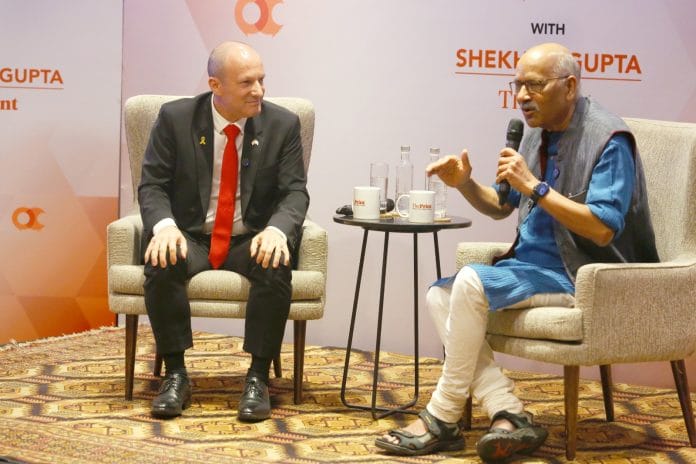Gurugram: The US is “fed up” of subsidising Europe’s security, and is now correcting the situation, like a father who gifts a Ferrari to his child, and then wants it back, said Reuven Azar, Israel’s Ambassador to India at ThePrint’s Off The Cuff Monday.
“For many years, many European countries thought that war was something of the past when it came to Europe. It would never come back. And therefore, they didn’t invest anything in their armed forces. Now they have come to the conclusion that they were wrong and that there was a huge gap between their ambitions when it came to the expansion of the European project and the capability to back it up with military power. And the Americans got fed up,” Azar said while in conversation with Shekhar Gupta, ThePrint’s Editor-in-Chief, at The Quorum in Gurugram.
The Israeli Ambassador added: “They (the US) got to a situation where there was preferential treatment on trade to some countries with a combination of subsidising their security and it was actually making them bankrupt. What this administration is trying to do is to correct the system.”
The US under President Donald J. Trump has sought greater investment in defence spending by European allies in the North Atlantic Treaty Organization (NATO). The members of the military alliance, consisting of 32 nations at its most recent summit last week, have agreed to achieve 5 percent of their gross domestic product (GDP) in defence spending by 2035.
Trump has long railed against the lack of investment in defence by Europeans. Almost two decades earlier in 2006, members of NATO arrived at a consensus to spend at least 2 percent of their annual budget on defence. In 2014, the member-states agreed to commit to the 2 percent target.
Despite agreeing to the commitment in 2014, at least eight NATO members, including Spain, Slovenia, Luxembourg, Belgium, Canada, Italy, Portugal and Croatia have yet to touch the 2 percent target.
“There’s a story about this guy that gave his son a Ferrari. One day, he decided to take the Ferrari. And the son was cursing him, saying, you don’t care about me, right? So now, America is taking back the Ferrari. You have to decide what you are going to do,” said Azar.
In the build-up to the NATO Summit at the Hague last week, Secretary-General Mark Rutte described Trump as a “daddy” while the two were discussing the situation in West Asia, between Iran and Israel.
The Europeans unveiled the red carpet for Trump at The Hague as an effort to keep the US President involved in NATO. He has in the past mulled over exiting the bloc and has even been unclear whether he would defend a member-state under attack.
Also read: Trump factor looms large as Canada pledges 2% of GDP on defence spending by end of fiscal year
5 percent on defence—the new normal?
Azar was asked whether the 5 percent standard agreed to by NATO has become the new standard for defence spending across the globe. The Israeli ambassador pointed out that before 7 October 2023, Israel was already spending 6 percent of its GDP on defence.
“Well, it depends on the threats. In our case (Israel), we were investing almost 6 percent of our GDP before the war. Hopefully we’ll be able to go back to these numbers in the future, especially if our economy continues growing and it seems that it is going to continue growing. But there are countries that are not threatened and therefore they don’t need to invest anything,” Azar said.
The Israeli ambassador added: “What our Prime Minister used to say is, don’t bother dealing with the percentage. Just make sure your economy grows.”
Investing in a nation’s defence, according to Azar, would have a positive impact on the economy by giving investors confidence to invest in the country. Coupling this investment with liberalisation policies would help economies innovate, the ambassador added.
“Build your defence and liberalise your markets. Because the stronger your defence, the more people will have the confidence to come and invest in your country. And the more you liberalise your market, the more people will feel free to be entrepreneurs,” said Azar.
The Israeli ambassador added: “We need more entrepreneurs. We have to have some ambassadors and people who get salaries from the government. But, you know, at the end of the day, the country is going to prosper thanks to the entrepreneurs.”
(Edited by Viny Mishra)
Also read: We’re not in ‘business’ of regime change or redrawing maps, says Israeli ambassador to India






